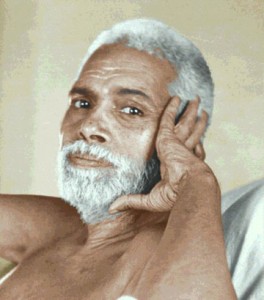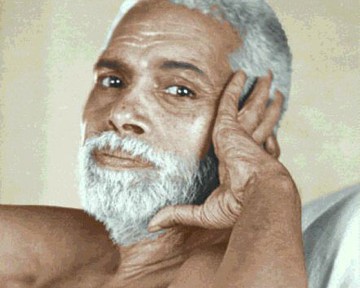Reality In Forty Verses
Reality In Forty Verses
By Ramana Maharshi, excerpts from The Collected Works of Ramana Maharshi,edited by Arthur Osborne. There is an excellent website for Ramana Ashram that includes many photos and all of Sri Ramana Maharshi’s works. Visit them on line at www.ramana-maharshi.org

Invocatory
a. If there were not being could there be any idea of being? Since that which is free from mental concepts and is within oneself, who is there to contemplate it? It is called the heart. Know that to remain within oneself as being is to contemplate it.
b. Those who have great fear of death seek refuge at the feet of the Supreme Lord who is without birth and death, in order to overcome their fear. They then die to themselves along with their adjuncts (sense of “I” and “mine”). Will those who are (have realized themselves to be) deathless entertain again the thought of death?
The Text
1. Since we perceive the world we must agree unanimously that there is a power which is capable of becoming multiple. The picture of name and form, he who sees it, the cloth on which it is based (painted) and the light which illuminates it are all oneself.
2. Every system of thought postulates the three fundamentals; the individual, God and world. Only the one appears as the three. It is only as long as there is an ego-sense that one says that the three are really three. The best thing is to renounce the ego-sense and remain in one’s true state.
3. ‘The world is real’, ‘No, it is a false appearance’, ‘The world is sentient’, ‘No it is not’, ‘The world is happiness’, ‘No it is not’. What is the use of such disputes? That state is agreeable to all in which, ignoring the world, one knows one’s Self, abandoning both unity and duality and the ego-sense is gone.
4. If one has a form the world and God will also have forms. If one has no form who is there to see their forms, and how? Can anything be seen without the eye? The real eye is the Self which is the eye of Infinity.
5. The body is of the form of the five sheaths. Therefore these five are included in the term ‘body’. Is there a world in the absence of the body? Has anyone ever seen the world without a body?
6. The world is of the form of the five (kinds of) sense-objects and nothing else. These five sense-objects are known by the five sense organs. As the one mind knows the world by means of the five sense organs, is there a world apart from the mind? Answer me.
7. Although the world and awareness of it rise and sink together, the world is perceived through awareness. That in which the world and the awareness of it rise and set is the Plenitude (purnam) which shines without rising (or setting).
8. Under whatever name and form one worships That which has no name and form, it is only a means of perceiving it. To know the truth of one’s Self as the true reality, and merge and become one with It is the only true perception (realization). Understand this.
9. The dyads and triads always depend upon the One. If one sees within one’s mind what that One is, they disappear. Only those who have seen this have seen the Truth. Know that they will never be perturbed.
10. There is no knowledge apart from ignorance and no ignorance apart from knowledge. Who is it who has this knowledge and ignorance? That Knowledge which knows the Self which is the basis of both, is the real Knowledge.
11. Is it not ignorance to know all else, without knowing the Self which is the source of knowledge? Can it be knowledge? When the Self, which is the basis of knowledge and the object of knowledge, is known; ignorance and knowledge cease to exist.
12. What is neither knowledge nor ignorance is (real) knowledge. Knowledge of (objects) cannot be real knowledge. The Self, which shines without there being anything else to know or be known, is knowledge. Know that it is not nothingness.
13. The Self, which is knowledge, is alone the truth. The knowledge of multiplicity is ignorance. This ignorance, which is unreal, has no existence apart from the Self, which is knowledge. Have diverse gold ornaments any reality apart from the gold of which they are made?
14. If the first person exists, the second and third persons will also exist. If the reality of the first person is enquired into and the first person ceases to exist, the second and third persons will (also) cease to exist, and all will shine as One. This is one’s true nature.
15. The past and the future depend upon the present. They are also present while they are current. There is only the present. Without knowing this truth, trying to know the past and the future is like trying to count without the unit (one).
16. When we look into them, what are time and space apart from us? If we are bodies we are involved in time and space, but are we? We are the same now, then and at all times; here, there, and everywhere. We exist; we who are beyond time and space alone are.
17. To those who have not realized the Self as well as to those who have, the body is ‘I’. To those who have not realized the ‘I’ is limited to the body. To those who have, within the body, realized the Self; the ‘I’ shines boundless. Know that this is the difference between them.
18. The world is real to those who have realized (the Self) as well as to those who have not. To those who have not realized, the world is merely the world; to those who have, truth is formless and shines as the substratum of the world. Know that this is the difference between them.
19. The dispute as to which prevails, fate or free will, interests only those who do not know the source of both. Those who have realized the Self, which is the ground of fate and free will, are free from them. Will they again resort to them?
20. Seeing God without seeing the Self who sees, is only a mental image. Only he who has seen himself has seen God, since he has lost his individuality and nothing remains but God.
21. If it be asked, ’What is the meaning of the old scriptural texts which speak of seeing oneself as seeing God?’ The reply is how, being one, one can see oneself? And if one cannot see oneself how is one to see God? Only by being swallowed up by God.

